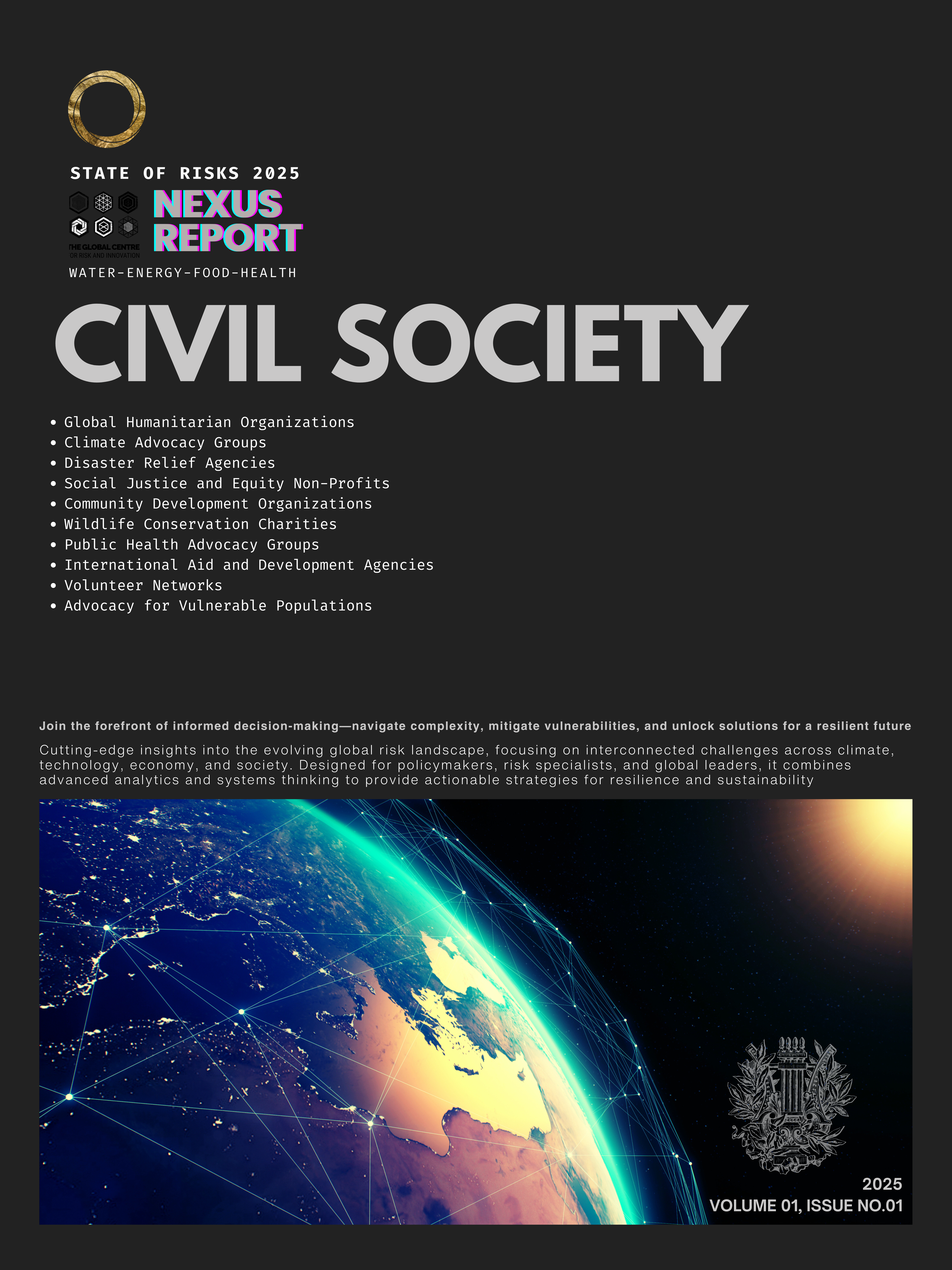State of Risks: Non-Profit and Civil Society (Print)
Nexus Reports offer a holistic approach to tackling challenges in the Non-Profit and Civil Society sector, integrating real-time data, advanced analytics, and sustainability-focused strategies. These reports empower organizations to improve operational efficiency, build resilience, and drive impactful change in a complex, interconnected world by addressing the Water-Energy-Food-Health Nexus.
Transform Communities. Enhance Resilience. Drive Global Impact.
$1,250.00
Nexus Reports provide the Non-Profit and Civil Society sector with critical insights to address interconnected risks and enhance resilience. Focusing on the Water-Energy-Food-Health Nexus, these reports equip humanitarian organizations, advocacy groups, and civil society actors with actionable strategies to navigate challenges, ensure sustainability, and maximize impact in their communities and causes.
Key Features
- Integrated Risk Analysis: Explore how the interdependence of water, energy, food, and health impacts humanitarian efforts, community development, and advocacy initiatives, including resource availability and resilience in vulnerable regions.
- Sustainable Community Solutions: Guidance on implementing sustainable practices in community projects, improving access to essential resources, and reducing environmental footprints to promote resilience.
- Real-Time Data for Informed Decision-Making: Leverage IoT and AI-powered analytics to monitor emerging risks, optimize aid distribution, and improve resource allocation during crises.
- Health and Well-Being Integration: Strategies to promote public health and nutrition, address water scarcity, and mitigate the impact of environmental factors on vulnerable populations.
- Equity and Social Justice Insights: Insights to support advocacy for marginalized communities, ensuring equitable access to essential resources and strengthening social resilience.
- Regulatory Compliance and Policy Support: Stay ahead of international humanitarian guidelines, climate policies, and health standards with in-depth analysis and compliance strategies.
- Tailored Recommendations: Specific strategies for diverse non-profit and civil society sectors to adapt to evolving risks at the nexus of water, energy, food, and health.
- Localized and Global Perspectives: Regional insights and global best practices tailored to unique community needs and advocacy challenges.
Who It’s For
- Global Humanitarian Organizations: Efficient resource distribution, crisis response, and ensuring access to essential services. Strategies for optimizing logistics, managing resource allocation efficiently, and supporting communities impacted by water, food, or energy scarcity.
- Climate Advocacy Groups: Effective advocacy for climate resilience, public education, and influencing policy. Guidance on data-driven campaigns, promoting water and energy conservation practices, and shaping sustainable policy recommendations.
- Disaster Relief Agencies: Quick response, logistics management, and addressing nexus-related vulnerabilities during disasters. Insights into using real-time data to anticipate and respond to crises, ensuring efficient deployment of resources, and building long-term resilience.
- Social Justice and Equity Non-Profits: Addressing systemic inequities in access to water, food, and energy, and advocating for vulnerable groups. Tools to support equitable resource distribution, promote social inclusion, and enhance community resilience through nexus-aware approaches.
- Community Development Organizations: Sustainable community growth, access to resources, and resilience-building. Recommendations for implementing community-driven sustainable projects, optimizing local resource use, and improving food and water security.
- Wildlife Conservation Charities: Protecting ecosystems, reducing habitat loss, and managing natural resources sustainably. Strategies for integrating sustainable water and energy use, reducing the impact of agriculture on habitats, and promoting biodiversity.
- Public Health Advocacy Groups: Promoting public health, ensuring access to clean water, and addressing nutrition and energy challenges. Guidance on water sanitation initiatives, promoting healthy food systems, and integrating energy access to support health infrastructure.
- International Aid and Development Agencies: Supporting sustainable development, mitigating risks related to resource scarcity, and ensuring resilience in developing regions. Insights into sustainable resource management, optimizing aid delivery, and promoting projects that address all aspects of the water-energy-food-health nexus.
- Volunteer Networks: Organizing effective volunteer efforts, ensuring resource efficiency, and maximizing community impact. Recommendations for mobilizing volunteers in nexus-driven projects, optimizing resources, and enhancing community engagement.
- Advocacy for Vulnerable Populations: Addressing immediate needs related to water, food, and energy while promoting long-term resilience. Strategies to provide direct assistance, advocate for policy changes, and ensure that vulnerable populations have access to essential services.
Why Nexus Reports?
Nexus Reports offer a holistic approach to tackling challenges in the Non-Profit and Civil Society sector, integrating real-time data, advanced analytics, and sustainability-focused strategies. These reports empower organizations to improve operational efficiency, build resilience, and drive impactful change in a complex, interconnected world by addressing the Water-Energy-Food-Health Nexus.
Transform Communities. Enhance Resilience. Drive Global Impact.
Discover more from Nexus Journals
Subscribe to get the latest posts sent to your email.









There are no reviews yet.